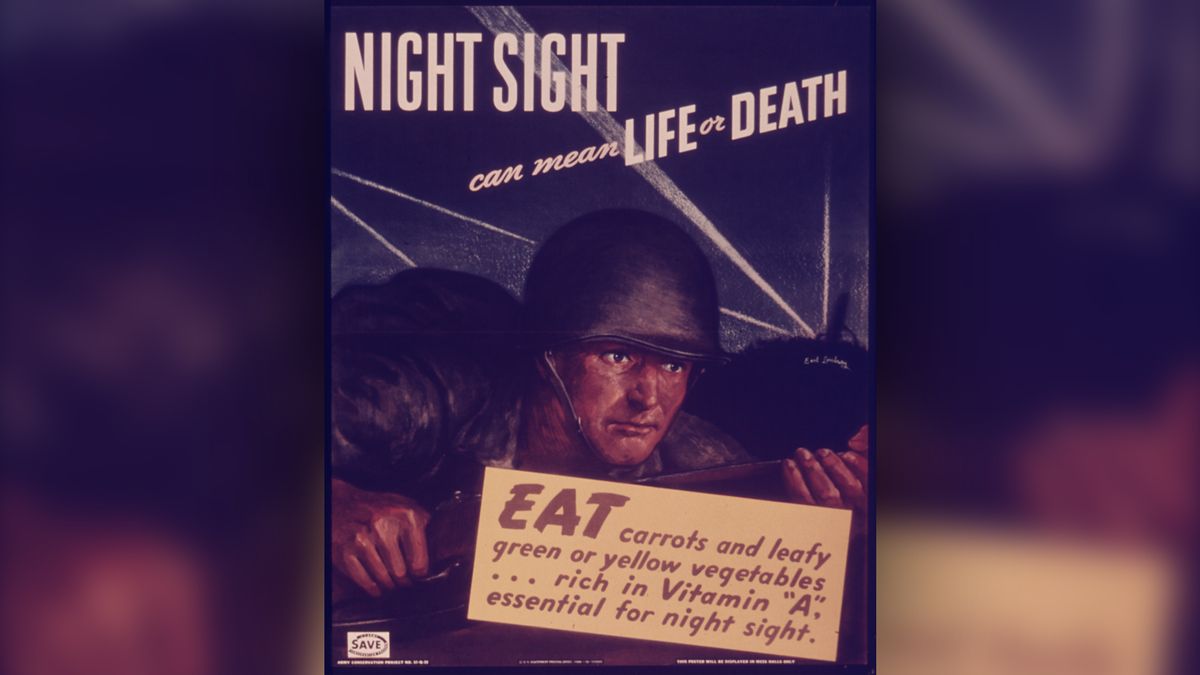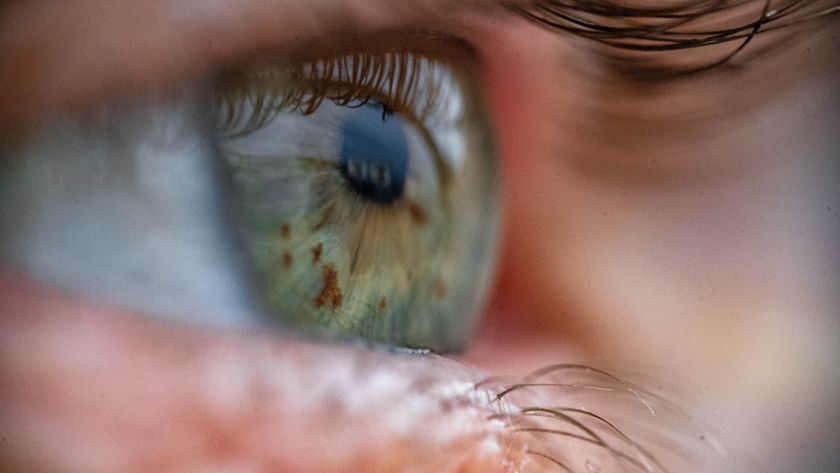
Can carrots give you night vision?
No, but there's some interesting history of British wartime deception behind it.

If you've ever believed that eating carrots will help you to see in the dark, then you've been retrospectively duped by a group of British civil servants from the 1940s.
If you already knew that the old adage was dreamed up by World War II propagandists, then you've probably been led to accept it's because London wanted to divert German attention away from British advances in aircraft radar technology.
According to this telling, the reason the Royal Air Force was so successful at thwarting the German air force, or the Luftwaffe's nighttime raids, was because its pilots were eating so many carrots — so no need for Hitler's spies to worry about any British advances in radar tech. But here again, you've been hoodwinked. This carrot-praising publicity blitz was primarily designed to deceive the United Kingdom's own citizens, rather anyone in the Third Reich.
Related: Why didn't the Allies bomb Auschwitz?
After France fell in 1940, the British were alone and cut off from their empire by German submarines, called U-boats. Keeping Brits well fed on the home front was critical to sustaining the fight, but food imports were becoming increasingly difficult to come by for the island nation. As it turns out though, the British weather lends itself very nicely to growing carrots. But there was a problem; the British consumer was far from keen.
"Carrots were never a very popular vegetable before World War II," said John Stolarczyk, curator of the World Carrot Museum. "It was considered a poor man's vegetable."
Yet, British carrot production during the war soared by 300%, Stolarczyk told Live Science. The government was therefore in the tricky situation of growing much-needed food that risked going to waste if public attitudes couldn't be changed. "The government extensively promoted carrots, mainly because they were available without import, therefore not subject to sea attacks, and were a viable substitute for rationed items," Stolarczyk explained.
Sign up for the Live Science daily newsletter now
Get the world’s most fascinating discoveries delivered straight to your inbox.
The answer, concluded Prime Minister Winston Churchill's government, was to tell the public a white lie. Posters went up to tout the carrot's supposed night vision properties, linking them to the Royal Air Force success. In reality, however, Royal Air Force pilots were so effective on night time missions because of their planes' on-board radar equipment.
Like most convincing falsehoods, there was a grain or two of truth to the propaganda. Firstly, carrots have high levels of beta-carotene and lutein, antioxidants that the body uses to produce vitamin A. This vitamin helps the eye convert light into a signal that can be sent to the brain for image processing, especially in low-light situations, Dr. Emily Chew, deputy clinical director of the National Eye Institute in Bethesda, Maryland, told Scientific American. That means carrots can help to improve vision for someone who is lacking in vitamin A, but it won't help people who already have adequate vitamin A levels achieve better vision. Moreover, the cornea (the clear, outer part of the eye) can be damaged if a person has vitamin A deficiency, according to a 2013 report in Community Eye Health Journal.
Secondly, British scientists did carry out experiments to see whether carrots could improve pilots' vision, said Stolarczyk, but those studies didn’t uncover anything of note. It was the on-board radar technology in British fighter planes that gave them the edge, not the airman's diet, and it's unlikely the British propagandists ever truly believed their campaign could distract German high command from such a fact. Moreover, in 1941, a British plane with on-board radar equipment made an emergency landing in France, and the Germans salvaged the remains, discovered the technology and wasted no time in developing a similar system, according to the World Carrot Museum.
"The publicity campaign was clearly intended more for the people at home than for the Germans," Stolarczyk said. "If the story was primarily aimed at German intelligence, it would be odd to plant it so blatantly in the British press. The Germans weren't that stupid."
Originally published on Live Science.

Benjamin is a freelance science journalist with nearly a decade of experience, based in Australia. His writing has featured in Live Science, Scientific American, Discover Magazine, Associated Press, USA Today, Wired, Engadget, Chemical & Engineering News, among others. Benjamin has a bachelor's degree in biology from Imperial College, London, and a master's degree in science journalism from New York University along with an advanced certificate in science, health and environmental reporting.











